Foster Collegiality: G2
No Room for Doubters
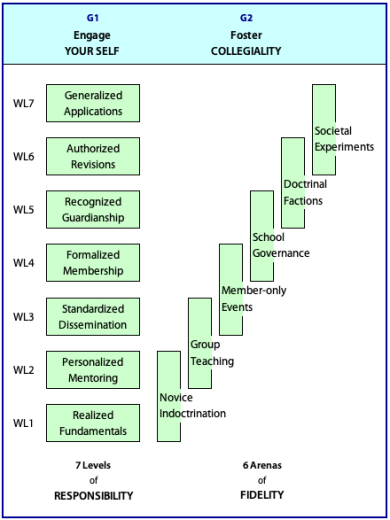
Any school that seeks to be stable and developing must be consistently faithful to the doctrine because it is the essential shared reality that defines its existence. Doubt weakens the doctrine and undermines the school. So forcefulness is the quality that is added by an adjacent level to create dyads to provide identity control.
For an adherent to become deeply immersed in and with a school of thought, mutual support with other adherents is essential. As a result, all concerned for the health of the school seek to .
is fostered by combining adjacent levels as dyads in which the lower level continues to be g1-genuine, while the upper level is g2-forceful.
This is a special sort of , one in which adherents monitor each other in regard to to the doctrine. So the dyads can be said to provide that are forcefully controlled.
It seems possible to classify as follows:
![]() In the lower 2 dyads, collegiality is based on controlling the thinking of beginners, and fidelity is expected scrupulously—, and .
In the lower 2 dyads, collegiality is based on controlling the thinking of beginners, and fidelity is expected scrupulously—, and .![]() More
More
![]() In the middle 2 dyads, collegiality is based on adherent participation in school activities, and fidelity is expected voluntarily—and .
In the middle 2 dyads, collegiality is based on adherent participation in school activities, and fidelity is expected voluntarily—and .![]() More
More
![]() In the upper 2 dyads, collegiality is based on theoretical preferences and biases, and fidelity is expected to allow innovation—and .
In the upper 2 dyads, collegiality is based on theoretical preferences and biases, and fidelity is expected to allow innovation—and .![]() More
More
Psychosocial Pressure
is likely driven by a pressure for understanding (which emerges from ) because collegiality requires endless discussions. Understanding is the basis for group formation and at this point in appreciating how schools function we are moving from the responsible individual to the supportive group.
This aligns with the general finding for G2 in structural hierarchies as investigated for Domain Fundamentals and Controls.
Arenas of Fidelity
G21: Novice Indoctrination
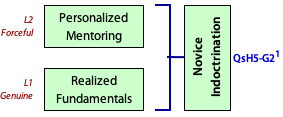
Initiates who wish to enter the school may be expected to participate in an introductory . As everyone in the school must be an adherent to the doctrine, the compulsion is typically welcomed and expected.
Such must be g1-genuine in regard to the indoctrinator's absolute commitment to the . Because there is a desire to ensure these are properly understood, the indoctrination must be g2-forceful and oriented to ferreting out and removing any deviant thinking, and this is ensured via .
If the initiate displays undesirable "independent thinking", this will become evident during the mentoring and the potential adherent will be asked to discontinue participation or get brutally ejected.
G22: Group Teaching
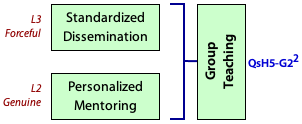
Collegiality is enhanced by engaging with the doctrine as a group. As part of their induction, new adherents are often expected to accept via lectures, seminars and workshops.
This experience enhances bonding amongst new adherents. Such bonds can become extremely important in the future when there must be an assessment whether a colleague's doctrinal revision represents a deviation from the doctrine or an enhancement
It follows that needs to be g2-forceful in regard to of the doctrine. However, the teaching requires to be bolstered by g1-genuinely providing for individuals within the group to deal effectively with their issues and reasonable queries.
G23: Member-only Events
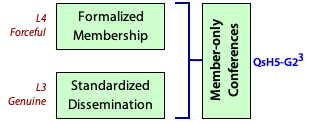
The school is kept alive by adherents constantly talking about the doctrine in a myriad ways. Such inward-oriented re-asserts the doctrine and its value. Different adherents describe the same thing with different examples and slight changes of emphasis. Any proposed revisions also need to be disseminated to the wider membership. Other discussions may touch on the history, on the founder, on future plans—all of which are deemed relevant to all members,
To enable this exchange of ideas and views, it is necessary to have regular programs of events. There may be a weekly meeting, a monthly seminar, time-limited topic-based working groups, annual conferences, publications. These events are always member-only.
must be g1-genuine in enabling of the doctrine amongst member, and g2-forceful in regard to the expecting support with organisation and regular attendance.
G24: School Governance
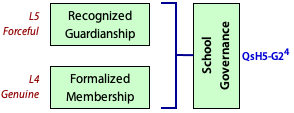
Those running the membership organisation primarily look after the mechanics of the school and its members: the finances, the various events, induction of adherents, external liaison etc. The councillors, whether elected, appointed or self-selected, are of varying capability and interest. Politics often plays a part in gaining their role, especially if the school has factionalized.
There is a more significant and profound task which is the shaping of the school as a vehicle for the doctrine going forward. I label this , as distinct from the membership body governance (which belongs in ). To determine priorities for the doctrine and the school, those individuals who are widely recognized as guardians, including elder statesmen, masters and orthodox leaders, must play the major role.
is therefore an activity to be performed g1-genuinely by the, in the context of a g2-forceful contribution by .
G25: Doctrinal Factions
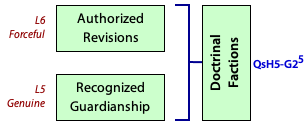
If a proposed reformulation or doctrinal extension is confirmed and accepted by and by repeated airings at , then it becomes .
Any significant is inherently theoretical i.e. it represents a new way to consider agreed facts or principles. So it is controversial. Some will want to ignore it, while others will handle the new ideas pragmatically. However, there can be some for whom the new theory seems so important that it must be protected and further developed. Those adherents sharing that view will likely meet regularly and form a theory-based group i.e. a
want the to be given ongoing value and this means being g2-forceful in regard to its significance, and then g1-genuinely providing for .
G26: Societal Experiments
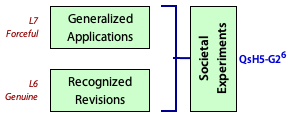
When a doctrine is applied to some issue in wider society, it needs to be adapted to those realities and this typically involves some doctrinal revision. However, convinced the pioneering adherent may be, it is usually rather uncertain as to whether society will accept the doctrine-based innovation. So applications always commence as . Resistance to change is usual and that means a degree of forceful control is required.
are g2-forceful in regard to the and depend on a g1-genuine that gets authorized by the wider membership.
Transition
The school emerges as a social entity if adherents handle and display . But to thrive and expand, there is a need for adherents to actively contribute to the life of the school.
It is therefore necessary for the school to of adherents, which is made possible by adding an additional level to form triads.
- Continue with Involvement-G3 Triads.
- Go to the review to see the full picture.
Originally posted: 28-Apr-2024.